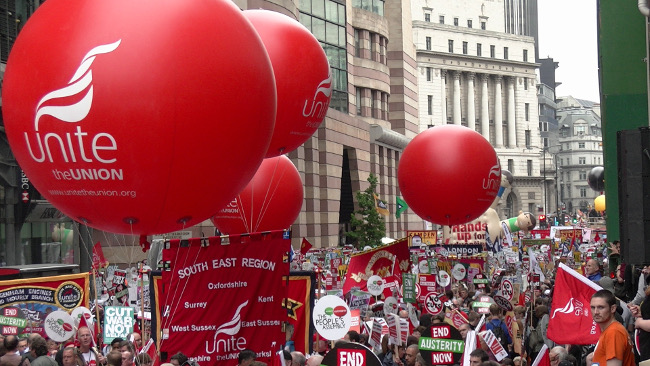British unions are preparing for a political battle with the Tories on Monday as the Commons begins to debate a controversial bill that could limit workers’ ability to strike.
Provisions from the Trade Union Bill will demand higher voting thresholds from unions before a strike, reduce unions’ ability to picket and allow use of agency staff to cover strikes.
Under the plans half of ballot-holders must vote in a poll for it to be valid, and 40 percent of eligible voters must back a strike in “key health, education, fire, transport, border security and nuclear decommissioning sectors” before such action can go ahead.
Frances O’Grady, general secretary of the Trade Union Congress, a club for unions, will tell its annual conference on Monday:
“If an employer believed we couldn’t strike, they wouldn’t bother to bargain. We wouldn’t have safe workplaces, we wouldn’t have paid holidays and we wouldn’t have equal pay.”
She will add:
“Nobody would deny that strikes can be inconvenient. But when it comes to a threat to the fundamental right to strike, the public are with us. Because that’s exactly what this government is doing. Attacking the very principle of the right to strike.”
Her comments were backed up by a number of trade unionist leaders, including Unite’s Len McCluskey and PCS’s Mark Serwotka, both of whom have threatened union action to rebut the Trade Union Bill.
“We have the ability to stop austerity in its tracks, to topple this government and to ensure we get a fairer society,” Serwotka told the Telegraph, the unionist having been controversially barred from voting in the Labour leadership contest over infiltration fears.
Tensions between unionists and the Tories are at a peak after the general election returned a surprise majority the Conservatives, who now lack the taming influence of the Liberal Democrats.
Evidence for this emerged as Vince Cable, former Lib Dem business secretary and Twickenham MP, who told the BBC last week:
“I worry now that the Tories are off the leash they can purse their ideological agenda and will do a lot of harm. They are very political. They see the trade unions and the Labour party as the enemy and the question is how do you weaken them? That is the starting point.”
Over the last few years London has been disrupted by Tube strikes that temporarily closed the underground rail service, the latest taking place in July.
However recent research from Oxford University has suggested that commuters found better ways to get to work after being forced to change their routes in a strike in February 2014, paradoxically benefiting the economy and transport system.
Defending the Trade Union Bill, employment minister Nick Boles said:
“Working people need to know they can get on with their lives without unjustified disruption. These modernising reforms will ensure strikes only happen as a result of a clear, positive and recent decision by those entitled to vote.”
Image Credit – End Austerity Now Protest, June 2015
